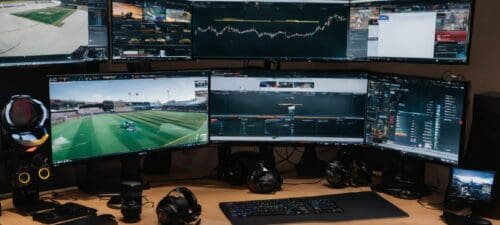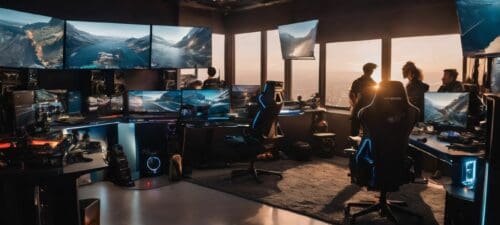Social Media and Community Management in Esports

Updated On: February 29, 2024 by James Connolly
Venturing through the ever-evolving realm of esports, it’s clear to see the vital importance of nurturing a robust online community. We understand the complexities you’re facing – after all, we’ve navigated these same waters ourselves.
Tapping into social media data can be transformative both for enhancing team dynamics and elevating fan engagement. Our forthcoming article delves into the key strategies for mastering social media and community stewardship within the esports sphere.
Join us as we share insights that could very well change the game!
Key Takeaways
- Social media is central to building and nurturing a vibrant esports community, with community managers playing a pivotal role in engaging and retaining players.
- Key skills for successful community management in gaming include effective communication, an understanding of social media and gaming platforms, the capacity to adapt quickly, problem-solving expertise, and knowledge of gaming culture.
- Utilising social data analytics helps shape content strategies that align with player preferences, thereby fostering loyalty and enhancing the overall experience within the esports industry.
- Managing multiple social media accounts effectively requires careful planning of content strategy tailored to each platform’s unique user base and employing tools for efficient team coordination.
The Importance of Esports Community Management
Esports community management is crucial for building a loyal and engaged community, creating a positive brand image, and improving player satisfaction. It plays a key role in maintaining healthy relationships with the gaming community and fostering a sense of belonging within the esports industry.
Building a loyal and engaged community
Our journey in building a loyal and engaged community starts with connecting gamers across the world through social media. By fostering immediate conversations, we create an inclusive atmosphere where both avid and novice players feel valued.
This inclusive approach increases our search ranking and drives more traffic to our websites, ensuring that everyone has a voice.
We use social data to understand what you love most about gaming, tailoring our strategies to meet your needs and interests. Keeping communication constant, we interact with fans regularly, allowing for collaboration that helps shape the future of esports.
Your input is crucial; it’s turned into actionable insights that improve team performance and enhance your gaming experiences. Engaging directly with you not only strengthens our community but also solidifies the bond between players, fans, and developers alike – making the online gaming universe even more vibrant.
Creating a positive brand image
Creating a positive brand image is essential for esports organisations to establish trust and credibility within the gaming community. By effectively managing social media platforms, engaging with fans, and showcasing the values of the brand, community managers can shape a favourable perception of the team or organisation.
Through strategic content creation and interaction, brands can communicate authenticity and build an emotional connection with their audience, ultimately leading to increased fan loyalty and support.
Social media has become a powerful tool for shaping brand identity in the esports industry. Leveraging data analytics from social platforms enables community managers to understand fans’ preferences and sentiments, refining strategies that align with their interests.
Improving player satisfaction
To enhance player satisfaction, community managers constantly gather feedback and engage with players to understand their preferences. By actively listening to the gaming community, we can identify areas for improvement and implement changes that directly address the needs of players.
Additionally, by creating a positive brand image through social media interactions, we reinforce our commitment to providing an exceptional gaming experience. Moreover, utilising social media analytics allows us to adapt strategies based on player engagement data, ensuring that our efforts are aligned with the desires of our gaming audience.
Furthermore, fostering open communication channels between players and game developers through social media platforms is crucial in addressing concerns promptly. This not only demonstrates a dedication to resolving issues but also helps strengthen trust within the gaming community.
The Role of a Community Manager in the Gaming Industry
Content creation and curation, interacting with players, gathering feedback, and social listening are just a few of the key responsibilities that a community manager in the gaming industry takes on to build and maintain a strong online community.
The role also involves attracting new players, networking within the industry, monitoring content performance, conducting competitor analysis, and brainstorming and planning content for maximum engagement.
Content creation and curation
When crafting content for the gaming community, we focus on creating and curating engaging and relevant material. This involves developing a content calendar that aligns with gameplay updates, events, and community milestones.
By conducting competitor analysis and social listening, we refine our strategy to deliver unique content that resonates with our audience’s interests.
Community managers play a pivotal role in brainstorming and planning diverse types of content – from tutorials and gameplay highlights to behind-the-scenes glimpses of the gaming industry.
We also monitor performance metrics to assess how our content is received by the community, allowing us to make adjustments as needed based on this feedback.
Interacting with players
After crafting and curating content for the gaming community, interacting with players is a crucial aspect of community management. Engaging in genuine conversations with gamers allows us to gather valuable feedback that can shape future content and initiatives.
By actively listening to player concerns and suggestions, we can foster an inclusive environment that demonstrates our commitment to meeting the needs of our gaming community. These interactions also provide the opportunity to attract new players as our engaging and responsive communication showcases the welcoming atmosphere within our esports community.
Utilising social media as a platform for player interaction enhances connectivity among gamers worldwide, fostering a sense of camaraderie and belonging within the gaming world. As avid gamers ourselves, we understand how vital these interactions are in maintaining strong connections with fans, pros, and game developers alike.
Gathering feedback
After interacting with players, gathering feedback is a crucial aspect of community management in the gaming industry. By actively seeking and listening to feedback from players, community managers can understand the needs, preferences, and concerns of the gaming community.
This valuable input helps in shaping content strategies, game development decisions, and overall community engagement initiatives.
Community managers harness social media platforms to gather feedback through comments, surveys, polls, and direct messages from gamers. Analysing this feedback provides insights into player satisfaction levels, potential areas for improvement within games or communities, and trending topics that resonate with the audience.
Social listening
After gathering feedback, social listening becomes a crucial aspect of community management in esports. It involves actively monitoring and analysing conversations, trends, and discussions within the gaming community across various social media platforms.
This allows community managers to stay attuned to the sentiments, preferences, and concerns of players and fans. By leveraging social listening tools and techniques, community managers can gain valuable insights into player behaviour and opinions, enabling them to tailor content strategies effectively and engage with the gaming audience in a more meaningful way.
Utilising social listening not only helps in understanding the needs of the gaming community but also provides opportunities for proactive engagement. By identifying trending topics or issues through social listening, community managers can swiftly address concerns or capitalise on popular conversations to foster deeper connections with gamers.
Attracting new players
To attract new players, we focus on creating engaging content that captures the excitement and thrill of esports. By offering exclusive behind-the-scenes peeks, showcasing player skills, and highlighting the unique aspects of our gaming community, we can pique the interest of potential gamers.
Engaging with fans in real-time conversations across social media platforms allows us to build a welcoming environment for newcomers and demonstrate the dynamic nature of our thriving gaming community.
Leveraging social media analytics helps us understand what resonates with different audiences, allowing us to tailor our content strategy to appeal to a broader spectrum of players worldwide.
Networking within the industry
Networking within the industry is crucial for community managers in gaming. It involves connecting with other professionals, game developers, influencers, and industry experts to stay updated on the latest trends, collaborations, and opportunities.
By building a strong network, community managers can gain valuable insights into player preferences and industry shifts while also staying informed about upcoming games and events.
Effective networking allows community managers to exchange ideas, share best practices, and collaborate on mutually beneficial projects. This not only fosters professional growth but also enhances the gaming community by creating synergistic relationships between different entities within the industry.
Monitoring and adjusting content performance
After establishing connections within the industry, community managers need to focus on monitoring and adjusting content performance. Utilising social media analytics is crucial for understanding what content resonates with the gaming community and identifying areas for improvement.
By tracking engagement metrics, such as likes, comments, shares, and click-through rates, community managers can make data-driven decisions to optimise their content strategy. Additionally, A/B testing different types of content can provide valuable insights into audience preferences and behaviour.
Social data enables community managers to stay agile in their approach by identifying trends, adapting strategies in real-time based on performance metrics while effectively gauging audience sentiment towards specific campaigns or initiatives.
Brainstorming and planning content
After monitoring and adjusting content performance, the next crucial step is brainstorming and planning new content to keep the community engaged. Understanding the interests and preferences of gamers is essential for creating content that resonates with them.
We use social media analytics to identify trending topics, popular game features, and player discussions to inform our content strategy. By leveraging this data, we can develop engaging and relevant content that encourages interaction and fosters a sense of community among gamers.
Our team collaborates to brainstorm creative ideas while considering the latest industry trends and upcoming events in gaming. This ensures that our content remains fresh, timely, and captivating for our audience.
Conducting competitor analysis
To stay ahead in the gaming industry, it’s crucial to actively monitor and analyse the strategies and performance of competitors. By keeping a close eye on their social media presence, content engagement, and community interactions, we can gain valuable insights into emerging trends and audience preferences.
This allows us to refine our own content strategies, identify areas for improvement, and capitalise on opportunities that may have been overlooked.
Regularly conducting competitor analysis also provides an opportunity to benchmark our performance against others in the esports industry. Understanding how other brands are engaging with their communities helps us to adapt and evolve our own approaches, ensuring that we remain competitive and relevant in the ever-changing gaming landscape.
By continuously learning from the successes and challenges of our peers, we can refine our social media marketing tactics and solidify our position as leaders in esports community management.
Essential Skills for Community Managers in Gaming
Community managers in the gaming industry must possess strong communication and interpersonal skills, a deep understanding of social media and gaming platforms, adaptability to problem solve, and knowledge of the gaming community and culture.
If you want to learn more about these essential skills for community managers in gaming, keep reading!
Communication and interpersonal skills
Effective communication and strong interpersonal skills are essential for community managers in the gaming industry. Engaging with players, gathering feedback, and interacting with stakeholders all require clear and concise communication.
Being able to convey a positive brand image through social media platforms is crucial for building a loyal and engaged community. Interpersonal skills come into play when networking within the industry, collaborating with team members, and fostering relationships with players, pro-gamers, and game developers.
Understanding the gaming community’s culture allows for more effective social interactions on various platforms while also creating a positive impact on player satisfaction.
The role of social media in esports has expanded the reach of gaming communities globally; therefore, having strong interpersonal skills can enhance interaction among passionate gamers worldwide.
Knowledge of social media and gaming platforms
Community managers in the gaming industry need to have a strong understanding of social media and popular gaming platforms. This knowledge allows them to effectively engage with players, share relevant content, and monitor community sentiment.
By leveraging this expertise, they can enhance player satisfaction, attract new users, and foster a positive brand image. Additionally, staying updated on the latest trends and features of various social media platforms enables community managers to tailor their strategies for maximum impact.
Understanding how gamers interact across different social media channels is crucial for developing effective engagement strategies within esports communities. With this knowledge, community managers can actively participate in conversations and build relationships with fans, ultimately strengthening the overall gaming community.
Ability to adapt and problem solve
Community managers in the gaming industry need to possess strong problem-solving skills and the ability to adapt quickly to changes. As the gaming landscape evolves rapidly, community managers must be adept at identifying potential issues and finding innovative solutions.
Understanding player feedback and adapting content strategies accordingly is crucial for maintaining a positive brand image and increasing player satisfaction. This adaptive mindset allows community managers to stay ahead of trends and deliver relevant, engaging content that resonates with the gaming community.
In addition to being quick on their feet, community managers also need to be data-driven problem solvers. Utilising social media analytics can provide valuable insights into audience preferences, content performance, and industry trends.
By constantly monitoring data and adjusting strategies based on these insights, community managers can ensure that their efforts are always aligned with the evolving needs of the gaming community.
Understanding of the gaming community and culture
Passionate and novice gamers alike must possess a deep understanding of the gaming community and culture to thrive in the esports industry. This includes recognising the diverse backgrounds, interests, and preferences that shape this dynamic community.
Delving into gaming history, game design principles, and emerging trends provides valuable insights into the gaming culture, fostering a genuine appreciation for its evolution.
Acknowledging the significance of shared experiences within the gaming world enables us to embrace a global sense of camaraderie. Engaging with fellow gamers on social media platforms allows us to celebrate our collective enthusiasm for games while respecting individual differences.
Best Practices for Managing Multiple Social Media Accounts
When it comes to managing multiple social media accounts in the gaming industry, it’s important to plan a content strategy that aligns with the unique characteristics of each platform.
Using social media management tools and delegating tasks within a team can also help ensure that your content is customised for each platform and effectively engages with the gaming community.
Planning a content strategy
Planning a content strategy is crucial for engaging gamers and building a strong online community. Understanding the interests and preferences of our audience helps us create targeted content that resonates with them.
By analysing social media data, we can identify trends, topics, and gaming-related discussions to inform our content calendar effectively. This proactive approach allows us to stay ahead of the curve and consistently deliver valuable content that keeps our community engaged.
Considering the fast-paced nature of the gaming industry, regularly evaluating and adjusting our strategies is essential for staying relevant. We need to remain adaptable and open to new ideas while leveraging social media analytics to refine our content strategy continuously.
Using social media management tools
Social media management tools provide valuable assistance in effectively managing multiple social media accounts for esports community engagement. These tools enable us to plan, schedule, and publish content across various platforms while gaining insights into audience behaviour and preferences.
By leveraging analytics from these tools, we can tailor our content strategy to maximise audience reach and interaction, ultimately enhancing the esports brand’s online presence.
Furthermore, using social media management tools allows us to monitor conversations about our brand in real-time, enabling prompt responses and fostering a sense of community among fans.
Delegating and collaborating with a team
Delegating and collaborating with a team is crucial for community managers in the gaming industry, as it allows for more efficient content creation and management. By assigning specific tasks to team members based on their strengths, we can ensure that all aspects of community management are covered effectively.
Collaboration fosters creativity and diversity in ideas, leading to well-rounded strategies that resonate with gamers worldwide.
Moreover, teamwork enables us to stay responsive to the ever-changing gaming landscape by pooling together various perspectives. Utilising each member’s knowledge of social media platforms and gaming trends ensures a comprehensive approach that caters to the varied interests within the gaming community.
Customising content for each platform
When it comes to customising content for each platform, we use tailored strategies based on the unique features and audience preferences of various social media channels. Crafting different types of content for platforms like Twitter, Instagram, Facebook, and Twitch allows us to effectively engage with diverse gaming communities.
By leveraging our knowledge of platform-specific best practices and trends, we enhance the visibility and appeal of our brand across multiple channels. Utilising this approach not only increases our reach but also ensures that we are able to connect with gamers in a meaningful way.
Understanding the distinct behaviours and interests of gamers on different platforms enables us to adapt our messaging accordingly. By personalising content to suit each channel’s dynamics, such as video-centric content for YouTube or image-focused posts for Instagram, we create an immersive experience for our audience.
Engaging with the community
After customising content for each platform, the next important step is engaging with the community. This involves actively participating in discussions, responding to comments and messages, and fostering a sense of belonging among passionate gamers.
Engaging with novice gamers by providing tips and advice can help create a welcoming environment for new players who might feel intimidated or overwhelmed by the gaming culture. Additionally, organising events, challenges, and tournaments can bring the community together and provide opportunities for interaction and friendly competition.
Utilising social media platforms to connect with fans on a personal level allows gaming brands to build trust and loyalty within their community. This engagement not only nurtures existing relationships but also attracts new followers who are drawn to the inclusive atmosphere cultivated by genuine interactions.
Evaluating and adjusting strategies
To ensure our social media and community management strategies are effective, we regularly evaluate and adjust them based on performance data. We monitor key metrics such as engagement rates, reach, and click-through rates to gauge the impact of our content.
By analysing this data, we can identify trends and insights that guide us in refining our approach. Additionally, we leverage social media analytics tools to gain a deeper understanding of our audience’s preferences and behaviour, allowing us to tailor our strategies accordingly for maximum impact.
Constantly adapting our strategies is crucial in the rapidly evolving world of esports and gaming communities. We take advantage of real-time feedback from our audience to make timely adjustments that resonate with gamers worldwide.
Conclusion
In conclusion, social media plays a crucial role in community management for esports. Community managers are essential for building a positive brand image and engaging with players to enhance satisfaction.
The gaming industry requires professionals with strong communication skills, knowledge of social media platforms, and the ability to adapt and problem-solve. To succeed in managing multiple social media accounts, creating a strategic content plan and utilising management tools are key practices.
By leveraging social data effectively, esports businesses can improve performance strategies and grow their fan bases worldwide.
FAQs
1. What does a game community manager do in esports?
A game community manager in esports handles social media and community management, working to build a strong gaming community, increase online fan engagement, and develop a solid esports branding strategy.
2. Why is community building important in the gaming industry?
Community building in the gaming industry fosters community engagement, helps manage an online community effectively, and strengthens relationships between gamers and the brand for better audience development.
3. Can social media improve audience engagement in esports?
Yes! Esports social media management involves using tailored social media strategies to enhance gaming community interaction and boost overall audience engagement.
4. What are some best practices for managing social networking within gaming communities?
Best practices include creating engaging content that resonates with the target audience, promoting regular and meaningful interactions to keep communities active, and implementing effective online community engagement techniques for sustaining interest.
5. How can esports organisations grow their communities through social media?
Esports managers can use targeted social media strategies specific to the gaming industry that encourage active participation from fans while also focusing on creating exciting content that aligns with core values of the Esports brand.
















